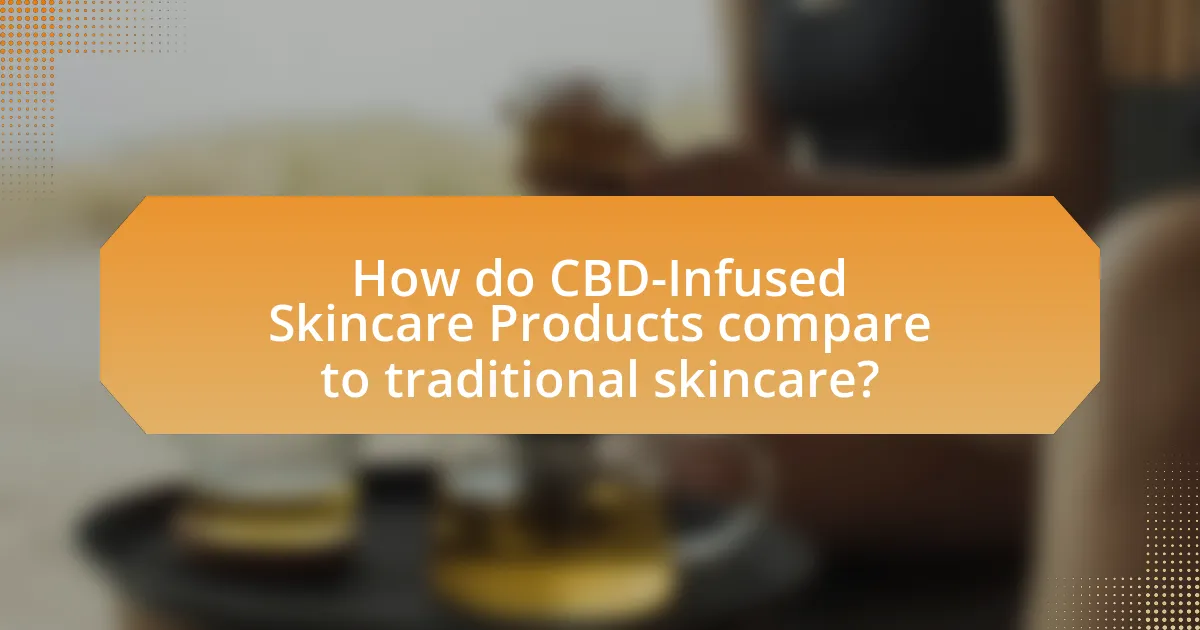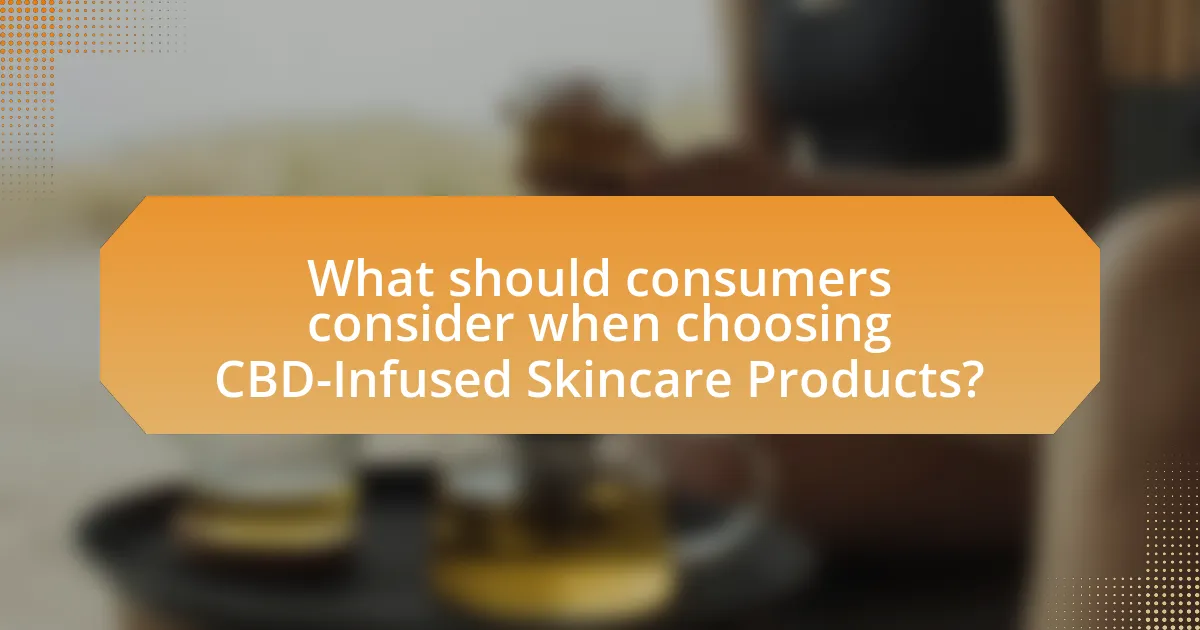CBD-infused skincare products are cosmetic formulations that incorporate cannabidiol (CBD), a non-psychoactive compound from the cannabis plant, known for its potential anti-inflammatory, hydrating, and soothing effects on the skin. The article explores how CBD is incorporated into skincare products, the extraction methods used, and the types of CBD commonly found in these formulations. It also discusses the key ingredients that enhance skin health, the scientific studies supporting CBD’s benefits for conditions like acne and eczema, and how these products compare to traditional skincare. Additionally, consumer perceptions, trends driving popularity, and best practices for selecting and using CBD skincare products are examined, along with potential side effects and legal considerations.

What are CBD-Infused Skincare Products?
CBD-infused skincare products are cosmetic formulations that incorporate cannabidiol (CBD), a non-psychoactive compound derived from the cannabis plant. These products are designed to provide potential benefits such as anti-inflammatory properties, hydration, and soothing effects on the skin. Research indicates that CBD may help alleviate conditions like acne and eczema due to its ability to regulate oil production and reduce inflammation.
How is CBD incorporated into skincare products?
CBD is incorporated into skincare products primarily through the infusion of CBD oil or extracts derived from hemp plants. These products often utilize formulations that blend CBD with other active ingredients, such as essential oils, vitamins, and botanical extracts, to enhance skin benefits. Research indicates that CBD possesses anti-inflammatory and antioxidant properties, which can help alleviate skin conditions like acne and eczema, making it a valuable addition to skincare routines.
What extraction methods are used for CBD in skincare?
The primary extraction methods used for CBD in skincare are CO2 extraction, ethanol extraction, and oil infusion. CO2 extraction is widely regarded as the most efficient and clean method, utilizing pressurized carbon dioxide to extract cannabinoids while preserving their purity and potency. Ethanol extraction involves soaking the plant material in ethanol, which effectively dissolves the cannabinoids, though it may also extract unwanted compounds. Oil infusion, a traditional method, involves steeping the plant in a carrier oil, allowing the cannabinoids to infuse into the oil, but this method may result in lower concentrations of CBD. These methods are validated by their prevalence in the industry and their ability to produce high-quality CBD extracts suitable for skincare formulations.
What types of CBD are commonly used in skincare formulations?
The types of CBD commonly used in skincare formulations include CBD isolate, broad-spectrum CBD, and full-spectrum CBD. CBD isolate is the purest form, containing 99% pure CBD without any other cannabinoids or compounds. Broad-spectrum CBD contains multiple cannabinoids and terpenes but excludes THC, providing potential benefits without psychoactive effects. Full-spectrum CBD includes all cannabinoids, terpenes, and a trace amount of THC, which may enhance the therapeutic effects through the entourage effect. These formulations leverage the anti-inflammatory and antioxidant properties of CBD, making them beneficial for skin health.
What are the key ingredients in CBD-infused skincare products?
The key ingredients in CBD-infused skincare products typically include cannabidiol (CBD), carrier oils such as hemp seed oil or coconut oil, essential oils for fragrance and therapeutic benefits, and various botanical extracts like aloe vera or chamomile. CBD serves as the primary active ingredient, known for its anti-inflammatory and antioxidant properties, which can help soothe the skin and reduce redness. Carrier oils provide hydration and nourishment, while essential oils and botanical extracts enhance the product’s efficacy and sensory experience. Studies have shown that CBD can positively impact skin conditions like acne and eczema, reinforcing its inclusion in skincare formulations.
How do these ingredients work together for skin health?
CBD and other ingredients in skincare products work synergistically to enhance skin health by providing anti-inflammatory, antioxidant, and moisturizing benefits. CBD, or cannabidiol, interacts with the endocannabinoid system in the skin, helping to regulate oil production and reduce inflammation, which can alleviate conditions like acne and eczema. Ingredients such as hyaluronic acid retain moisture, while vitamins C and E offer antioxidant protection, combating free radicals that contribute to skin aging. Together, these components create a balanced formula that promotes hydration, reduces redness, and improves overall skin texture, leading to healthier skin.
What role does CBD play compared to other ingredients?
CBD serves as a key ingredient in skincare products, primarily known for its anti-inflammatory and antioxidant properties, which help soothe the skin and reduce redness. Unlike other common ingredients such as hyaluronic acid or retinol, which focus on hydration and anti-aging respectively, CBD specifically targets inflammation and skin irritation, making it particularly beneficial for conditions like acne and eczema. Research indicates that CBD can modulate the skin’s endocannabinoid system, promoting balance and overall skin health, which is a unique role compared to traditional skincare ingredients that do not interact with this system.
What are the potential benefits of using CBD-infused skincare products?
CBD-infused skincare products offer several potential benefits, including anti-inflammatory properties, hydration, and antioxidant effects. Research indicates that CBD can reduce inflammation, which may help alleviate conditions like acne and eczema. Additionally, CBD is known to enhance skin hydration by regulating oil production, leading to improved skin texture. Furthermore, its antioxidant properties can protect the skin from oxidative stress and environmental damage, contributing to a healthier appearance. Studies, such as one published in the Journal of Clinical Investigation, have shown that cannabinoids can modulate skin cell functions, reinforcing the validity of these benefits.
How can CBD help with specific skin conditions?
CBD can help with specific skin conditions by reducing inflammation, alleviating acne, and improving skin hydration. Research indicates that CBD possesses anti-inflammatory properties, which can help soothe conditions like eczema and psoriasis by calming the skin and reducing redness. Additionally, a study published in the Journal of Clinical Investigation found that CBD can inhibit the production of sebum, the oily substance that contributes to acne, thus potentially reducing breakouts. Furthermore, CBD’s moisturizing effects can enhance skin hydration, making it beneficial for dry skin conditions.
What scientific studies support the benefits of CBD for skin health?
Scientific studies indicate that CBD has beneficial effects on skin health, particularly in reducing inflammation and managing conditions like acne and eczema. For instance, a study published in the Journal of Clinical Investigation in 2014 by Desreumaux et al. demonstrated that CBD can inhibit the production of sebum, which is a contributing factor to acne. Additionally, research in the Journal of Dermatological Science in 2019 by Oláh et al. found that CBD possesses anti-inflammatory properties that can help alleviate symptoms of eczema and psoriasis. These studies provide concrete evidence supporting the use of CBD in skincare for its potential to improve various skin conditions.

How do CBD-Infused Skincare Products compare to traditional skincare?
CBD-infused skincare products offer unique benefits compared to traditional skincare by leveraging the anti-inflammatory and antioxidant properties of cannabidiol. Research indicates that CBD can help reduce acne, soothe irritation, and improve skin hydration, which traditional products may not specifically target. A study published in the Journal of Clinical Investigation found that CBD can inhibit the production of sebum, a key factor in acne development, while traditional skincare often relies on ingredients like salicylic acid or benzoyl peroxide that may cause irritation. Additionally, CBD’s potential to enhance skin barrier function and reduce signs of aging presents a distinct advantage over conventional formulations that may lack these properties.
What are the main differences between CBD-infused and non-CBD skincare products?
CBD-infused skincare products contain cannabidiol, a compound derived from the cannabis plant, which is known for its anti-inflammatory and antioxidant properties, while non-CBD skincare products do not include this compound. The presence of CBD in skincare products can help reduce redness, soothe irritation, and provide hydration, making them beneficial for conditions like acne and eczema. In contrast, non-CBD products typically rely on traditional ingredients such as oils, acids, and botanicals for skin benefits, which may not offer the same anti-inflammatory effects. Studies have shown that CBD can interact with the skin’s endocannabinoid system, potentially enhancing skin health and providing relief from various skin issues, a benefit not found in non-CBD formulations.
How do the effects of CBD on the skin differ from traditional ingredients?
CBD affects the skin differently than traditional ingredients by providing anti-inflammatory and antioxidant properties that can help reduce acne and soothe irritation. Unlike conventional skincare ingredients, which often focus on hydration or exfoliation, CBD interacts with the skin’s endocannabinoid system, potentially regulating oil production and promoting overall skin balance. Research indicates that CBD can inhibit sebum production, which is a key factor in acne development, while traditional ingredients may not address this underlying issue. Additionally, studies have shown that CBD can enhance skin barrier function, offering protection against environmental stressors, a benefit not typically associated with standard skincare components.
What are the consumer perceptions of CBD versus traditional skincare?
Consumer perceptions of CBD skincare versus traditional skincare indicate a growing preference for CBD-infused products due to their perceived natural benefits and therapeutic properties. Many consumers believe that CBD offers anti-inflammatory and antioxidant effects, which can enhance skin health, while traditional skincare is often viewed as containing synthetic ingredients that may cause irritation. A survey conducted by Brightfield Group in 2021 found that 60% of CBD users reported improved skin conditions, reinforcing the perception that CBD is a beneficial alternative to conventional products. Additionally, consumers are increasingly drawn to the holistic and wellness-oriented image associated with CBD, contrasting with the more clinical approach of traditional skincare brands.
Why are consumers turning to CBD-infused skincare products?
Consumers are turning to CBD-infused skincare products primarily for their potential anti-inflammatory and antioxidant properties. Research indicates that CBD can help reduce skin conditions such as acne and eczema by regulating oil production and calming inflammation. A study published in the Journal of Clinical Investigation found that CBD significantly reduced sebum production in human sebocytes, which supports its efficacy in treating acne. Additionally, consumers are attracted to the natural and holistic approach of CBD, as it is derived from hemp and is perceived as a safer alternative to synthetic ingredients commonly found in skincare products.
What trends are driving the popularity of CBD in the beauty industry?
The popularity of CBD in the beauty industry is driven by increasing consumer demand for natural and holistic ingredients. This trend is supported by a growing awareness of the potential benefits of CBD, such as its anti-inflammatory and antioxidant properties, which appeal to consumers seeking effective skincare solutions. Additionally, the rise of wellness culture has led to a preference for products that promote overall well-being, further enhancing the appeal of CBD-infused beauty products. Market research indicates that the global CBD skincare market is projected to reach $1.7 billion by 2025, reflecting the significant consumer interest and investment in this segment.
How do marketing claims influence consumer choices regarding CBD skincare?
Marketing claims significantly influence consumer choices regarding CBD skincare by shaping perceptions of efficacy and safety. Consumers often rely on these claims to assess the potential benefits of CBD, such as anti-inflammatory properties or skin hydration. Research indicates that 70% of consumers are more likely to purchase products that highlight specific benefits, such as “reduces redness” or “promotes skin healing.” Furthermore, the credibility of these claims, often supported by scientific studies or endorsements from dermatologists, enhances consumer trust and drives purchasing decisions. For instance, a study published in the Journal of Cosmetic Dermatology found that consumers are more inclined to buy skincare products with claims backed by clinical evidence, demonstrating the direct impact of marketing on consumer behavior in the CBD skincare market.

What should consumers consider when choosing CBD-Infused Skincare Products?
Consumers should consider the source and quality of CBD when choosing CBD-infused skincare products. High-quality CBD is typically derived from organically grown hemp, ensuring it is free from pesticides and harmful chemicals. Additionally, consumers should look for third-party lab testing results, which verify the product’s cannabinoid content and confirm the absence of contaminants. Transparency in labeling, including the concentration of CBD and other active ingredients, is also crucial for informed decision-making. Finally, understanding individual skin types and potential sensitivities to CBD or other ingredients can guide consumers in selecting the most suitable products for their skincare needs.
How can consumers identify high-quality CBD skincare products?
Consumers can identify high-quality CBD skincare products by examining the product’s ingredient list, sourcing information, and third-party lab testing results. High-quality products typically contain full-spectrum or broad-spectrum CBD derived from organically grown hemp, ensuring minimal exposure to pesticides and heavy metals. Additionally, reputable brands provide transparent lab results that confirm the potency and purity of their CBD, allowing consumers to verify the absence of harmful substances. For instance, a study published in the Journal of Cannabis Research highlights that products with clear labeling and third-party testing are more likely to meet safety and quality standards.
What certifications or lab tests should consumers look for?
Consumers should look for certifications such as USDA Organic, GMP (Good Manufacturing Practices), and third-party lab test results when selecting CBD-infused skincare products. These certifications ensure that the products meet specific quality and safety standards. For instance, USDA Organic certification indicates that the ingredients are grown without synthetic fertilizers or pesticides, while GMP certification confirms that the manufacturing process adheres to strict quality control measures. Third-party lab tests provide transparency regarding the cannabinoid content and the absence of harmful substances, such as heavy metals or pesticides, thereby validating the product’s safety and efficacy.
How does the source of CBD affect product quality?
The source of CBD significantly affects product quality by determining the purity, potency, and overall effectiveness of the final product. High-quality CBD is typically derived from organically grown hemp, which is less likely to contain harmful pesticides, heavy metals, or other contaminants. For instance, a study published in the Journal of Cannabis Research found that products sourced from certified organic farms had higher cannabinoid concentrations and fewer impurities compared to those from non-organic sources. Additionally, the extraction method used can influence the quality; CO2 extraction is known for preserving the integrity of cannabinoids and terpenes, leading to a more effective product. Therefore, the source of CBD directly correlates with the safety and efficacy of CBD-infused skincare products.
What are the best practices for using CBD-infused skincare products?
The best practices for using CBD-infused skincare products include conducting a patch test, applying products consistently, and choosing high-quality formulations. Conducting a patch test helps to identify any potential allergic reactions, ensuring the product is safe for individual skin types. Consistent application maximizes the benefits of CBD, which has been shown to possess anti-inflammatory and antioxidant properties, promoting healthier skin. Selecting high-quality products is crucial, as research indicates that products with verified CBD content and minimal additives are more effective. For instance, a study published in the Journal of the American Academy of Dermatology highlights the efficacy of CBD in reducing acne and improving skin hydration.
How should consumers incorporate CBD skincare into their routines?
Consumers should incorporate CBD skincare into their routines by starting with a patch test to assess skin sensitivity, followed by integrating products gradually. This approach allows consumers to monitor their skin’s reaction to CBD, which has been shown to have anti-inflammatory properties that may benefit various skin conditions. Research indicates that CBD can help reduce acne and improve skin hydration, making it a valuable addition to skincare regimens. By applying CBD-infused creams or serums after cleansing and before moisturizing, consumers can maximize the potential benefits of CBD for healthier skin.
What common mistakes should be avoided when using CBD-infused products?
Common mistakes to avoid when using CBD-infused products include not checking the product’s concentration, neglecting to consider individual skin types, and failing to conduct a patch test before full application. Many consumers overlook the importance of product concentration, which can vary significantly; for instance, a study published in the Journal of the American Medical Association found that only 30% of CBD products are accurately labeled regarding their CBD content. Additionally, different skin types may react differently to CBD, making it essential to tailor product selection to individual needs. Lastly, skipping a patch test can lead to adverse reactions, as noted in dermatological guidelines that recommend testing new products on a small skin area first.
What are the potential side effects or concerns with CBD skincare?
CBD skincare can cause side effects such as skin irritation, allergic reactions, and changes in skin texture. Research indicates that while CBD is generally well-tolerated, some individuals may experience adverse reactions due to sensitivity to cannabinoids or other ingredients in the formulation. A study published in the Journal of the American Academy of Dermatology found that topical CBD can lead to contact dermatitis in susceptible individuals. Additionally, the lack of regulation in the CBD market raises concerns about product quality and consistency, which can further contribute to potential side effects.
How can consumers mitigate any adverse reactions to CBD products?
Consumers can mitigate adverse reactions to CBD products by starting with a low dosage and gradually increasing it while monitoring their body’s response. This approach allows individuals to identify their tolerance levels and minimize the risk of side effects. Research indicates that individual reactions to CBD can vary significantly, with some experiencing mild effects such as fatigue or gastrointestinal discomfort. By adjusting the dosage based on personal experience, consumers can find an optimal level that reduces the likelihood of adverse reactions. Additionally, consulting with a healthcare professional before starting CBD can provide personalized guidance and ensure safety, especially for those with pre-existing conditions or who are taking other medications.
What should consumers know about the legality of CBD in skincare?
Consumers should know that the legality of CBD in skincare varies by jurisdiction. In the United States, the 2018 Farm Bill legalized hemp-derived CBD containing less than 0.3% THC federally, allowing its use in cosmetics and skincare products. However, individual states may have their own regulations, which can restrict or permit CBD use differently. For example, some states have specific laws governing the sale and labeling of CBD products, while others may not allow CBD in cosmetics at all. Therefore, consumers should verify local laws and regulations regarding CBD skincare products to ensure compliance and safety.



